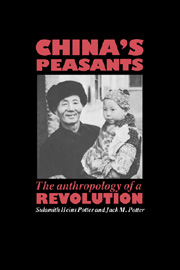Book contents
- Frontmatter
- Contents
- List of illustrations
- List of tables
- Preface
- Notes on the text
- Map 1 China
- 1 The old “feudal” order: Zengbu before Liberation
- 2 Establishing the new order
- 3 The ordeal of collectivization
- 4 The Cultural Revolution
- 5 Maoist society: the production team
- 6 Maoist society: the brigade
- 7 Maoist society: the commune
- 8 Impatient aspirations: transition to the post-Mao period
- 9 The cultural construction of emotion in rural Chinese social life
- 10 Marriage, household, and family form
- 11 Chinese birth planning: a cultural account
- 12 Lineage and collective: structure and praxis
- 13 Party organization
- 14 The party ethic: a devotion born of distress and enthusiasm
- 15 A caste-like system of social stratification: the position of peasants in modern China's social order
- 16 The Chinese peasants and the world capitalist system
- 17 The crystallization of post-Mao society: Zengbu in 1985
- References
- Index
15 - A caste-like system of social stratification: the position of peasants in modern China's social order
Published online by Cambridge University Press: 02 December 2009
- Frontmatter
- Contents
- List of illustrations
- List of tables
- Preface
- Notes on the text
- Map 1 China
- 1 The old “feudal” order: Zengbu before Liberation
- 2 Establishing the new order
- 3 The ordeal of collectivization
- 4 The Cultural Revolution
- 5 Maoist society: the production team
- 6 Maoist society: the brigade
- 7 Maoist society: the commune
- 8 Impatient aspirations: transition to the post-Mao period
- 9 The cultural construction of emotion in rural Chinese social life
- 10 Marriage, household, and family form
- 11 Chinese birth planning: a cultural account
- 12 Lineage and collective: structure and praxis
- 13 Party organization
- 14 The party ethic: a devotion born of distress and enthusiasm
- 15 A caste-like system of social stratification: the position of peasants in modern China's social order
- 16 The Chinese peasants and the world capitalist system
- 17 The crystallization of post-Mao society: Zengbu in 1985
- References
- Index
Summary
The distinction between rural and urban dwellers in the People's Republic of China has been made the basis for classification into two caste-like civil status groups, a higher status group called “urban personnel,” and a lower status group called “rural personnel.” Membership in either group is inherited from the mother, assigned at birth, and cannot be changed except under the most extraordinary circumstances. The result is a system of birth-ascribed stratification which, considered as a whole, displays caste-like features.
The system is simultaneously a product of Chinese cultural assumptions and of a characteristically Chinese interpretation of Marxist ideas. The idea that membership in a class status category is inherited is present at the level of an assumption in Chinese society. As Hinton says, discussing the matter in Fanshen (1966),
Was one to consider the present status of the family, the status several years back, or the status in the light of several generations? When left to themselves, the peasants of Long Bow tended to go back two and even three generations. This was in accord with habits deeply ingrained in the Chinese people, habits which had much precedent in the culture of the past. Under the old imperial examination system, for example, candidates had to prove not only that they themselves were not representatives of some barred category (boatman, actor, prostitute, or other “wandering” type) but also that their parents and grandparents were free of any such taint.
- Type
- Chapter
- Information
- China's PeasantsThe Anthropology of a Revolution, pp. 296 - 312Publisher: Cambridge University PressPrint publication year: 1990
- 11
- Cited by



